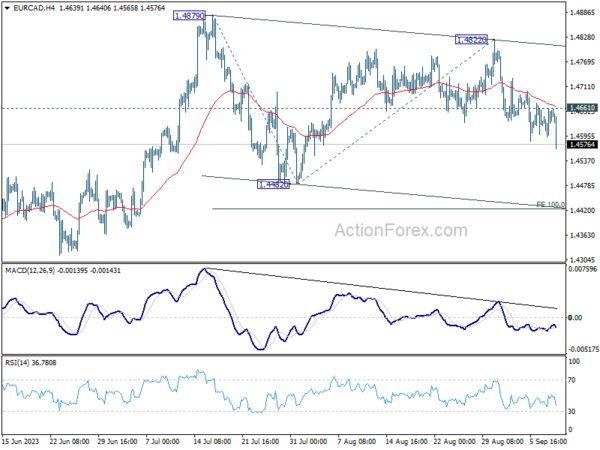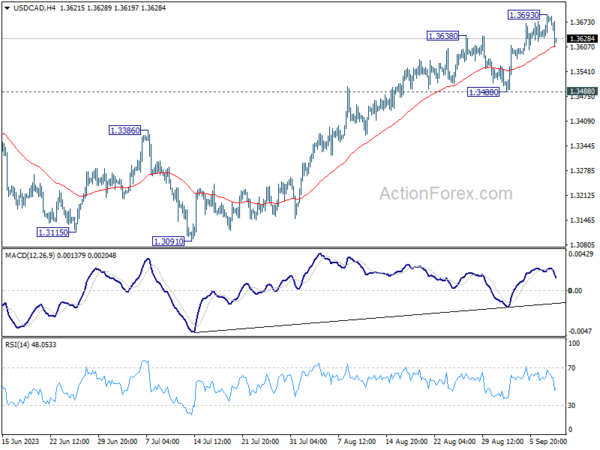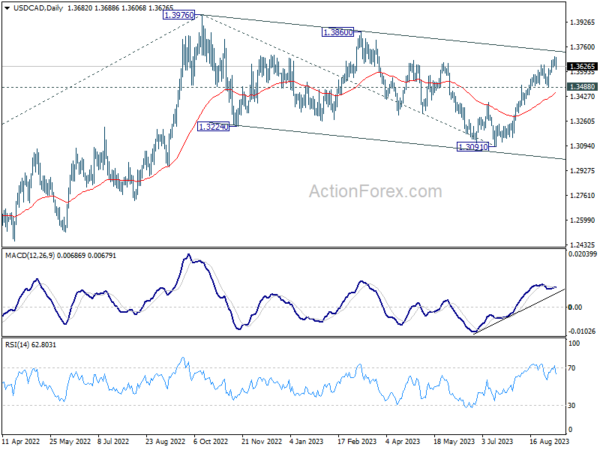Canadian Dollar is having a notable uplift in early US session, propelled by stronger than expected employment data that underscores a persistently robust and tight labor market scenario in the country. The revelations from the data could potentially pose hurdles in the path of Canada’s disinflation journey, a process which, according to BoC governor Tiff Macklem, has already slowed. Despite BoC’s decision to maintain rates unchanged earlier this week, the potential for future hikes remains, especially if the tight labor market persists and threatens the disinflation progress.
While Canadian Dollar displayed strength, US Dollar seemed to be retracting some of its recent gains, landing it among the day’s underperformers. This setback for the greenback is potentially a mere digestion of its near-term ascents. Yen, after momentarily benefiting from Japan’s verbal interventions, also showed signs of softening. Across the Atlantic, Euro recorded modest declines against its European counterparts. This slip can be attributed to anticipations of economic contraction in Germany – the Eurozone’s economic powerhouse – this year, as forecasted by a leading German research institute.
Technically, EUR/CAD’s fall from 1.4822 resumes after the Canadian job release. This decline is seen as the third leg of the consolidation pattern from 1.4879. Deeper fall is expected as long as 1.4661 resistance holds, to 1.4482 support, or further to 100% projection of 1.4879 to 1.4482 from 1.4822 at 1.4425.
In Europe, at the time of writing, FTSE is up 0.11%. DAX is down -0.07%. CAC is up 0.34%. Germany 10-yaer yield is down -0.0005 at 2.611. Earlier in Asia, Nikkei dropped -1.16%. China Shanghai SSE dropped -0.18%. Singapore Strait Times dropped -0.58%. Japan 10-year JGB yield dropped -0.0071 to 0.651.
Canada employment grew 39.9 in Aug, unemployment rate steady at 5.5%
Canada employment grew 39.9k in August, well above expectation of 20.0k. Unemployment rate was unchanged at 5.5%, below expectation of 5.6%, stabilized after three consecutive monthly increases. Employment rate fell -0.1% to 61.9%.
Average hourly wages rose 4.9% yoy, down from July’s 5.0% yoy. Total hours worked rose 0.5% mom, 2.6% yoy.
Germany poised for mild economic contraction in 2023, DIW reports
Germany stands on the brink of being the only major economy to register a contraction in 2023, with German economic research institute, DIW, projecting a -0.4% dip in the nation’s economic output for the year. This downturn is primarily attributed to sluggish domestic consumption and a falter in export dynamics, exacerbated by a slowed Chinese economy.
Looking forward, however, the institute holds a more positive outlook, forecasting a steady 1.2% growth in both 2024 and 2025. Geraldine Dany-Knedlik, the co-head of forecasting and economic policy at DIW, envisages that a pronounced increase in wages and salaries would spur household expenditure, kickstarting a recovery phase.
Timm Bönke, also a co-head at the DIW’s forecasting department, anticipates a notable improvement in the consumer sentiment owing to a substantial dip in inflation rates in the forthcoming period. Households will be encouraged to enhance their spending, propelled by improved financial conditions and a potentially steadier inflation environment.
Japan cash earnings growth slows to 1.3% yoy, real wages down for 16th month
In July, Japan experienced slowdown in growth of labor cash earnings, recording increase of 1.3% yoy, a figure notably below expectation of 2.4% yoy. This decline comes in the wake of a 2.3% yoy surge in June and a 2.9% yoy hike in May.
Drilling down into the details, while the base annual salary grew 1.6% yoy, outpacing June’s 1.3% yoy rise, overtime pay experienced a reduced uplift of 0.5% yoy, a significant deceleration from the 1.9% yoy in June.
One of the more concerning revelations is the continued drop in real wages, which adjusted for inflation, decreased by -2.5% yoy, a deepening from June’s -1.6% yoy decline. This marks the 16th consecutive month of falling real wages, spotlighting inability of salaries to keep pace with escalating prices, thereby exacerbating the financial strain on households.
Corroborating this trend is separate data published earlier this week which highlighted a pronounced drop in household spending in July, plummeting -5.0% yoy, marking its most substantial decline in close to two and a half years.
USD/CAD Mid-Day Outlook
Daily Pivots: (S1) 1.3648; (P) 1.3671; (R1) 1.3711; More….
Intraday bias in USD/CAD is turned neutral with today’s retreat, and some consolidations could be seen below 1.3693. But the favored case is still that correction from 1.3976 has completed at 1.3091. Further rally is expected as long as 1.3488 support holds. Above 1.3693 will resume the rally from 1.3091 to 1.3860 resistance, and then 1.3976 high.
In the bigger picture, price actions from 1.3976 are viewed as a corrective pattern only. Upon completion, rise from 1.2005 (2021 low) would resume through 1.3976. Next target is 61.8% projection of 1.2005 to 1.3976 from 1.3091 at 1.4309. For now, this will remain the favored case as long as 55 D EMA (now at 1.3436) holds.
Economic Indicators Update
| GMT | Ccy | Events | Actual | Forecast | Previous | Revised |
|---|---|---|---|---|---|---|
| 23:30 | JPY | Labor Cash Earnings Y/Y Jul | 1.30% | 2.40% | 2.30% | |
| 23:50 | JPY | Bank Lending Y/Y Aug | 3.10% | 2.80% | 2.90% | |
| 23:50 | JPY | GDP Q/Q Q2 F | 1.20% | 1.40% | 1.50% | |
| 23:50 | JPY | GDP Deflator Y/Y Q2 F | 3.50% | 3.40% | 3.40% | |
| 06:00 | EUR | Germany CPI M/M Aug F | 0.30% | 0.30% | 0.30% | |
| 06:00 | EUR | Germany CPI Y/Y Aug F | 6.10% | 6.10% | 6.10% | |
| 06:45 | EUR | France Industrial Output M/M Jul | 0.80% | 0.20% | -0.90% | |
| 12:30 | CAD | Net Change in Employment Aug | 39.9K | 20.0K | -6.4K | |
| 12:30 | CAD | Unemployment Rate Aug | 5.50% | 5.60% | 5.50% | |
| 12:30 | CAD | Capacity Utilization Q2 | 81.40% | 82.50% | 81.90% | 81.80% |
| 14:00 | USD | Wholesale Inventories Jul F | -0.10% | -0.10% |



